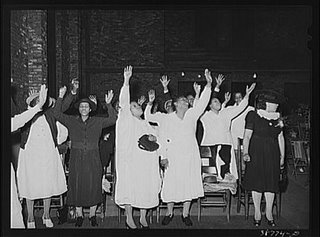A Wind that Swirls Everywhere – Christianity Today Magazine
 Pentecostal theologian Amos Yong says we should surely be engaging with other religions so that we can discern what the Holy Spirit is doing in each and learn from them – perhaps even integrate.
Pentecostal theologian Amos Yong says we should surely be engaging with other religions so that we can discern what the Holy Spirit is doing in each and learn from them – perhaps even integrate.
“Christians should be open to learning from and being enriched by the Spirit’s work in world religions. Dialogue must take place alongside evangelism, he argues, so that all the religionsincluding Christianitycan learn from each other what the Spirit is doing.”
Evangelism is redefined:
“Dialogue and proclamation are not mutually exclusive but intrinsically connected,” he writes. “A pneumatological approach to the non-Christian faiths “¦ opens up the Christian to whatever is true, good, beautiful, and holy in the other traditions, even while nurturing an environment in which the non-Christian can come to appreciate the same in Christian faith. What else is this besides grassroots ‘evangelism’?”
Pluralism lurks beneath the shaddow of his Bibleless Christianity:
In his theology, the world religions are instruments of God, play a role in God’s providence, and have much to contribute to Christianity. “[C]hristians should be open to learning from other religious traditions because of the unfinished character of Christian identity,” he writes. “While we are being formed into the eschatological image of Jesus, we continue to look through the glass dimly. If others have something to say about God, should we not at least listen both sympathetically and critically?”
Bibleless, you say? – Yep:
He is determined simply to follow the Spirit wherever the Spirit leads and let the theological chips fall where they may. And one place where Yong sees the Spirit as especially active is along the perimeters of world pentecostalism, where younger churches absorb elements of their cultures and traditional religions into their theologies and practices. He cites as an example an African movement that combines Islam and Christianity. His conclusion is typically ambiguous (and perhaps ambivalent): “My point is not to embrace “¦ these developments but to be spurred on to discernment and theological reflection by what is happening in the Christian-Muslim encounter.”
Where is the Bible’s authority in this:
This raises a second question: What criteria should we use for discerning the Spirit’s work in non-Christian movements? Yong hesitates to elevate Jesus Christ to exclusive status for such discernment. For him, “signs of the kingdom,” such as personal and social transformation in love, might serve as such tools. The Spirit might be active, then, wherever the kingdom of God is being advanced, whether or not Jesus Christ is central to the religious messages and practices.
What is Christianity Today’s take on this budding new theologian:
In the meantime, Yong is proving to be a cutting-edge Pentecostal scholar, whose non-Western perspective is offering fresh ways of looking at old theological problems.
Here’s another reason why we need to actively apply Jude 3. In my opinion, Yong is a good example of the logical conclusion to the Pentecostal penchant for emphasizing the Holy Spirit’s voice to the exclusion of the Bible. And note, he is not one of the so-called fringe crazies on TBN that some accuse opponents of Pentecostalism of always emphasizing. No, here is a bona fide theological intellectual carrying his Pentecostal theology to its necessary conclusion: a Bibleless, pluralistic, syncretistic brand of religion with a Christian twist.






